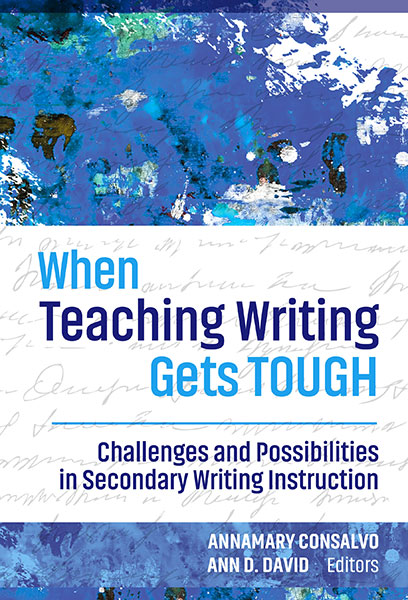Professors: Request an Exam Copy
Print copies available for US orders only. For orders outside the US, see our international distributors.
Edited by: Annamary Consalvo, Ann D. David
Publication Date: November 22, 2024
Pages: 160
Series: Language and Literacy Series

Teach writing to adolescents with these proven-effective approaches.
Writing instruction is a particular challenge because there is no singular, linear solution to teaching students to write well. This book approaches writing as a wicked problem that takes place in complicated contexts.
Through both scholarly research and teacher reflection, When Teaching Writing Gets Tough examines ELA classrooms and the experiences of writing teachers to identify approaches that have proven effective with adolescents. The book uses wickedity to frame the problems of teaching writing and offers context-specific solutions enacted by teachers. While it addresses the realities of standardized ways of teaching and assessing writing, the book also highlights the deep professional knowledge and practical strategies teachers bring to writing instruction in middle and high school classrooms.
Chapters grapple with tensions between testing and authenticity, assessing writing in nuanced ways, and finding enjoyment in the work of teaching writing amid and alongside persistent complexities. Specific topics include students’ writing process, revision, students as decision-makers, multimodal writing, assessment and writer’s notebooks, data-driven instruction, the high school–to-college transition, and teacher professional development.
Book Features:
Annamary Consalvo is an associate professor of literacy at The University of Texas at Tyler. Ann D. David is an associate professor of teacher education at the University of the Incarnate Word and codirector of the San Antonio Writing Project.
“All writers know the struggle of putting words on a page, and writing teachers feel the additional demands of changing standards, increased testing, and reduced amounts of time for instruction. From ‘perfectionist composers’ in their classrooms to imperfect professional development experiences, these challenges often seem insurmountable. Yet, Consalvo, David, and the 21 additional teacher writers in this collection show how these situations can, when examined critically, inspire purpose. Through inquiry and action, they identify—if not fully resolve—many of the wicked problems presented. And, in doing so, they move toward new possibilities in writing classrooms, both for their students and for themselves.
—Troy Hicks, chairperson, Department of Teacher and Special Education at Central Michigan University and director of the Chippewa River Writing Project
“Through a blend of scholarly research and teacher reflection, this book establishes writing instruction as a 'wicked problem'—one that transcends rigid, standardized approaches and demands a deep appreciation for the complex contexts in which writing takes place. Each chapter convincingly illustrates the complexities faced by writing educators and offers a variety of joyful and fulfilling ways to support young writers in classrooms, such as building writerly confidence and assessing writing in holistic ways.”
—Amy Vetter, professor of secondary English education, The University of North Carolina Greensboro
“I have often worked with teachers that were surprised, and relieved, to learn that the problems they had in the writing classroom were not their problems or failures, but the problems. This book names and frames our classic problems in ways that incite curiosity, provoke inquiry, and honor the complexity of teaching writing with real, live human beings.”
—Anne Elrod Whitney, professor of language and literacy education, The Pennsylvania State University
Contents
Introduction 1
Part I: Wicked Components of the Writing Process
1. Micromoments in a High School English Classroom: Wicked Problems and Wicked Solutions of Teaching Writing 15
Annamary Consalvo
2. The Wicked Problem of Revision 26
Denise N. Morgan and Jessica Hrubik
3. Positioning Writers as Decision Makers 36
Valerie Taylor
Part II: Intersection of Wickedity and Authenticity
4. Overcoming Wicked Writing Formulas With Adaptive Creativity and Design 47
Tiffany Larson and Brett Stamm
5. Working With Teachers of Writing in At-Risk Schools: The Effects of Professional Development 57
Julie Smit, Lien Nguyen, Narges Hadi, and Lu Guo
6. Audience and Authenticity: The Wicked Way to Build Motivation and Confidence 67
Garrett Simpson
Part III: Assessment
7. “We Just Don’t Write Like That in Class”: Teachers and Students Take On the Wicked Problem of High-Stakes Writing Assessment 75
Joelle Pedersen
8. Making Notebooks Institutionally Visible: The Wicked Problem of Assessing Notebook Practices 86
Ann D. David
9. Handling Wicked Problems Isn’t Always About Solving Them, Is It? 98
Heathcliff Lopez and Candice Mendiola
Part IV: Transition From High School to College
10. The Wicked Problem of the High-School-to-College Writing Transition: Interrogating the Metaphors That Guide Our Practice 109
Amber Jensen, Amy D. Williams, Joseph Wiederhold, and Chanel Earl
11. Writing Is . . . Meaningful, Independent, Authentic, and Blended: Moving From the Wicked Problems of Standardization and Compartmentalization 120
Lara Searcy and Libby Vance
12. Writing in the Age of AI: The Wicked Problem of Process Versus Product 130
J. J. Sylvia IV and Elise Takehana
Conclusion 141
Index 143
About the Authors 149
Professors: Request an Exam Copy
Print copies available for US orders only. For orders outside the US, see our international distributors.